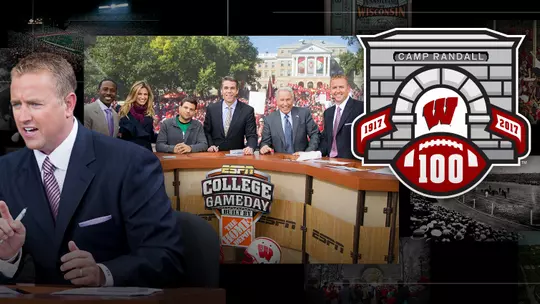
Camp Randall 100: Kirk Herbstreit
Broadcaster found stadium a hostile environment as Ohio State quarterback
Mike Lucas
8/17/2017
The Camp Randall 100 is an exclusive list celebrating 100 people who have shaped Camp Randall Stadium's history across the realms of sports, music, culture and beyond. A new honoree will be revealed each day over the final 100 days leading up to kickoff of the Wisconsin football team's season opener with Utah State on Friday, Sept. 1. The Camp Randall 100 reveal is part of a year-long celebration of the history of the iconic stadium, which opened in 1917.
MADISON, Wis. — Before he called games from high above the turf at Camp Randall Stadium, Kirk Herbstreit was an Ohio State captain preparing to take the field for a pregame coin toss in 1992.
When one of the police officers stationed at the end of the visitors' tunnel advised Herbstreit to put on his helmet before stepping into view of the raucous Camp Randall crowd, he had a feeling he might be in for a long day.
The Badgers got the better of the Ohio State quarterback that day, but Herbstreit — who has become a fixture on ESPN College GameDay and serves as the network's top analyst — doesn't hold a grudge against the historic venue or its fans.
In fact, Madison sits near the top of his list of places to call a game.
Read more in Herbstreit's Camp Randall 100 profile below.
Camp Randall 100: Kirk Herbstreit
ABC and ESPN college football analyst Kirk Herbstreit has grown quite fond of Mickies Dairy Bar, a landmark diner across from Camp Randall Stadium. “I love going there,” said Herbstreit.
During a recent visit with UW grad Kenny Dichter, an intrepid entrepreneur, Herbstreit was introduced to The Scrambler: a scrum of eggs, cheese, bacon, sausage, Yanks (fried potatoes) and gravy.
“I had always gone there for milkshakes,” said Herbstreit, who has been ESPN College GameDay‘s meal ticket since 1996. “I had never realized breakfast was so big and such a big thing here.”
Whenever the opportunity presents itself, Herbstreit enjoys walking along Breese Terrace and soaking in the sights, sounds and smells on the west side of the stadium.
“I have so many good friends at Wisconsin,” said Herbstreit, who lives in Nashville, Tennessee. “I always look forward to coming up to Madison. It has almost become a home away from home really.”
That dates to his playing days at Ohio State.
“I knew it as a player first,” he said of the Camp Randall Stadium environment. “I would say over the years it has maintained the great reputation thanks to a raucous student body.”
Herbstreit was here in 2010 when David Gilreath returned the opening kickoff 97 yards for a touchdown to electrify the crowd and spark the Badgers to an upset of No. 1-ranked Ohio State.
“To take the opening kick to the house really set the tone that night,” recalled Herbstreit, who will soon celebrate his 48th birthday. “I don’t know if I’ve ever heard Camp Randall louder than that.”
On the bus ride from the team hotel to Camp Randall Stadium, Kirk Herbstreit sensed trouble. “Guys were asleep,” he said. “They had their heads back and they were snoring.”
The bus was carrying the No. 12-ranked Ohio State Buckeyes (3-0), a heavy favorite over Wisconsin (2-1) in the 1992 Big Ten opener. “I remember it like it was yesterday,” Herbstreit said.
After serving as an understudy to Greg Frey and Kent Graham, the unheralded Herbstreit, a Centerville, Ohio, native, got his shot to lead John Cooper’s offense as a fifth-year senior quarterback.
Herbstreit was selected as a team captain (a title that his father, Jimmy Herbstreit, held in 1960 when he was a running back and defensive back for the Buckeyes. He later coached for Woody Hayes).
“We had struggled our first two games at home,” Herbstreit remembered, “and got booed off the field our second game which we won narrowly against a pretty good MAC team, Bowling Green.
“Preparing to go and play at Syracuse, I made a comment publicly that I was looking forward to getting on the road and away from our home crowd — an unusual comment to make for a captain. I think we were looking ahead to Syracuse for three weeks and we finally got to play that game and we played up to our potential despite a bunch of injuries. We really played unified.”
The Buckeyes completely overwhelmed No. 8 Syracuse, 35-12, at the Carrier Dome. Eddie George rushed for three touchdowns and Herbstreit completed 10 of 19 passes for 156 yards and a touchdown.
That was followed by a bye in the schedule before coming to Madison for an 11 a.m. kickoff. And it didn’t take long for Herbstreit to realize that his teammates had little jump or urgency.
“I’m looking around the bus,” Herbstreit said, “and thinking, ‘This could not be any more opposite of the bus ride that we had leaving the hotel and going to the Carrier Dome to play Syracuse.’
“Collectively, we didn’t respect them (the Badgers). We just kind of went in there and they were ready to take us apart. They wanted it, they were more determined.”
The Buckeyes were flat and going through the motions.
“And Wisconsin was not yet Wisconsin with Alvy (Barry Alvarez),” he noted of the Hall of Fame coach. “They were trying to become that and we were just kind of sleep-walking through the game.”
The Badgers stunned the Buckeyes, 20-16. It was their first win in a Big Ten opener since 1981 and first over a ranked team since 1985. Herbstreit was sacked five times.
Outside linebacker Chad Yocum, a rangy sophomore from Windsor, Wisconsin, had three sacks for losses of 8, 10 and 11 yards. Yocum was also credited with three quarterback hurries.
Not that Herbstreit was at full speed. He was operating on a tender ankle which he had injured in Ohio State’s second game. Plus, the Buckeyes lost tailback Robert Smith to an injury. Without him, Ohio State managed to rush for just 45 net yards on 35 attempts.
“Alvy points to that game,” Herbstreit said, “as a real turning point of his era to kind of show his guys, ‘Hey, we can play with the Ohio States, we can play with the Michigans.’
“He and I have become really good friends since then. And I always tell him, ‘I’m glad that I was able to get your brilliant career started.’”
Gallery: Camp Randall 100: Kirk Herbstreit
Twenty-five years later, Herbstreit still has one lasting memory from that game.
“I’ll never forget walking into the stadium when (linebacker) Steve Tovar and I went out for the coin toss,” he said, recalling that the visiting team then exited through a tunnel in the student section.
“They had like a chain-link fence over the top of the tunnel. And it was like the barbarians were smashing on top of that fence and we were coming into the gladiator pit.
“You had two state troopers on both sides of the entrance to the field. The cops looked at us and said, ‘Gentlemen, I suggest you put your helmets on.’ I’m like, ‘Gosh, what’s going on here?’”
Over the last two decades, Herbstreit has returned many times to Camp Randall as a broadcaster. He has always ranked the atmosphere among the finest in college football.
“It has gained a reputation since the early ’90s,” he said, “as one of the tougher places to play in the Big Ten, and that’s from a player’s perspective.”
Herbstreit separates crowds into two categories: reactive and proactive.
“A reactive crowd to me,” he said, “is when the home team makes an interception or gets a sack or scores a touchdown and the crowd goes crazy. Anyone can be a reactive crowd.
“A proactive crowd is actually a true 12th man. In college football, the force and energy of a home crowd creates turnovers; their energy creates blocked punts; they really help the defense out.
“Whether it’s first, second, third down, the crowd is involved and making an impact on the game. Camp Randall is that kind of atmosphere. They are a proactive crowd.”
And he says that’s a huge advantage for the Badgers.
Match UW against a marquee foe (Ohio State, Michigan, Penn State) or rival (Iowa, Minnesota) and stage the game under the lights and Herbstreit knows how special Camp Randall can be.
“I would put that energy and atmosphere up there with any stadium,” he said.
That begs the question, do elite teams get intimidated on the road?
“Great teams kind of welcome the challenge,” he opined. “Smart coaches do a good job in that it’s kind of preemptive, ‘Hey, it’s us against the world’ type of mentality.
“With that being said, it’s one thing to be able maybe to block that out (crowd noise) and maybe not let it affect you a certain way. But over the course of 60 minutes, because momentum is such a big part of the sport, you’ll see even the best-coached teams with great poise still have their moments (when they may succumb).
“And it could cost a team a game because of a big sack, a fumble, some kind of turning-point play. That’s the beauty of college football and having the home field advantage.”















